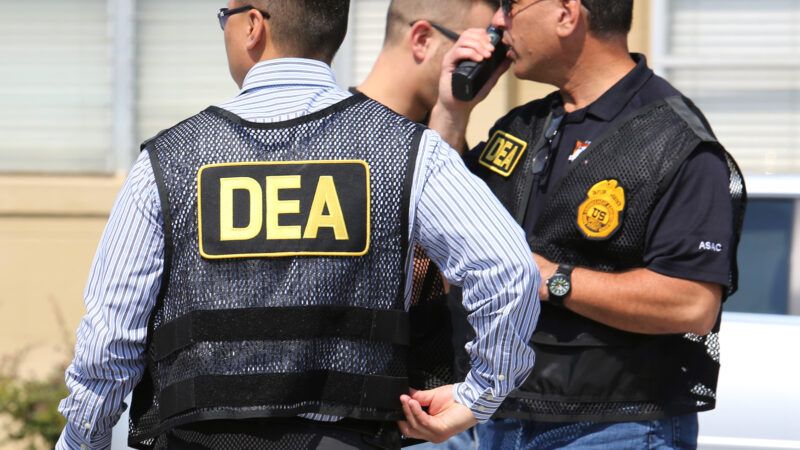DEA's Domestic Surveillance 'Mission Creep'
It appears that DEA agents have been employed on non-drug-related investigations for far longer than they were originally authorized.

Normally, when Americans see a story mentioning the Drug Enforcement Administration (DEA), they expect it to deal with the nation's endless (and futile) war on drugs. And most of the time, the news about or coming from the DEA concerns illicit drug trafficking, arrests, and prosecutions. But during the 2020 national protests against the murder of George Floyd by Minneapolis police, the DEA got publicity for another mission its leadership generally doesn't want to discuss: domestic surveillance.
On June 2, 2020, BuzzFeed News reporters Jason Leopold and Anthony Cormier broke the story that the Justice Department (DOJ) had authorized the DEA to go outside of its normal legal boundaries of drug enforcement. The DEA was authorized "to enforce any federal crime committed as a result of protests over the death of George Floyd." The mission included "covert surveillance," according to the DEA memo obtained by BuzzFeed.
That authority was supposed to expire after two weeks, but after pursuing litigation using the Freedom of Information Act (FOIA), an investigation by the Cato Institute has thus far failed to confirm that the DEA's covert surveillance operations were, in fact, terminated by mid-June 2020. Moreover, DOJ documents obtained by Cato in the litigation show that the DEA has engaged in such non-drug enforcement operations nearly 30 times since February 2005.
Of the 27 specific episodes listed in the documents, four involved providing security at Super Bowls and 10 other sporting events; five involved unspecified "assistance" after natural disasters, including after Hurricane Matthew in Haiti in 2016; three others involved "investigative assistance" after the murder of local police officers in Dallas, San Antonio, and Baton Rouge, Louisiana. None of the 27 episodes appear to have had any connection to the DEA's stated mission of enforcing the nation's drug laws.
To date, no explanation as to why state and local law enforcement agencies were somehow inadequate at providing security or appropriate investigative resources for the episodes has been contained in the limited records released. What is also unknown at this point is the extent to which DEA personnel engaged in physical or electronic surveillance at any of these events.
The documents obtained by Cato also reveal that the day after the BuzzFeed story ran, Rachel Bissex, then deputy chief of staff and counselor to Attorney General Bill Barr, emailed a number of other Justice Department officials to pass the word that "OLA [Office of Legislative Affairs] is getting a ton of incoming on the delegation of authority memos to DEA and others because of recent articles."
Bissex's use of the phrase "and others" is clearly a reference to other Justice Department law enforcement components such as the FBI, the Bureau of Alcohol, Tobacco, Firearms, and Explosives, and the U.S. Marshals Service.
Cato's FOIA litigation against the Justice Department over this matter is ongoing, with the hopes of learning more about the DEA's role in domestic surveillance during the 2020 protests. But the revelation that other DOJ components have received such non-primary mission delegations of authority should be a concern to any citizen engaged in First Amendment–protected public protest activities.
These latest revelations about the frequency with which DEA agents have been employed on non-drug related investigations, and the fact that other DOJ components have also received such out-of-mission taskings, point to a clear, urgent need for a far more sweeping congressional investigation of the practice and the extent to which American's rights may have been violated by its repeated use.
The looming expiration of the Foreign Intelligence Surveillance Act's (FISA) Section 702 provision provides House and Senate legislators exactly the opportunity to think—and act—more broadly and boldly on domestic surveillance reform by tackling this out-of-mission abuse at the same time.
Thanks to the efforts of Reps. Jamie Raskin (D–Md.) and Nancy Mace (R–S.C.), the FBI is already the subject of a Government Accountability Office (GAO) investigation for its use of so-called "assessments"—investigations that require no criminal predicate to open and which can involve physical surveillance and extensive database searches on a target. But the Raskin-Mace initiative is, so far as I am aware, the only one of its kind presently focused on any Justice Department component, and it does not address the DEA problem described above.
Congressional overseers could change that by tasking GAO to also investigate the scope and potential civil liberties violations of such out-of-mission investigative and surveillance authority delegations and attaching that directive to any FISA Section 702 reauthorization bill.
The question is, will they?


Show Comments (17)